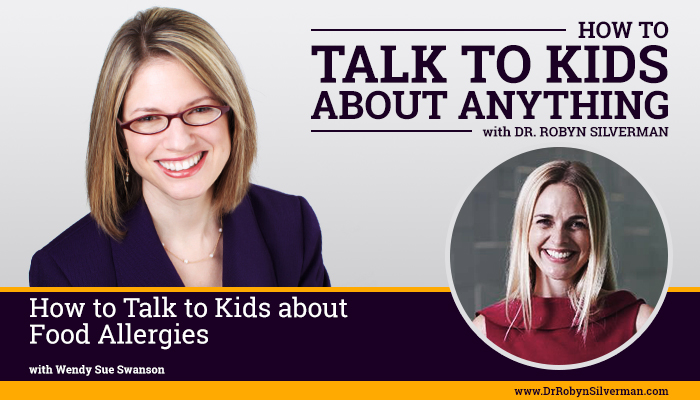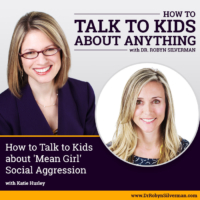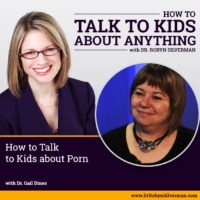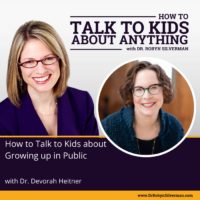Podcast: Play in new window | Download
Subscribe: Apple Podcasts | RSS | More
How to Talk to Kids about Food Allergies
This podcast focuses on food allergies in children. D. Wendy Sue Swanson, Chief of Digital Innovation at Seattle Children’s Hospital, talks about how early exposure to food allergens can help children’s immune systems to stay healthier and how we can help to keep kids who do have food allergies safe in classrooms, at parties and on playdates. Ultimately, we find that the top take-aways are to (1) expose children to high allergen foods early and often if possible to train the immune system and (2) teach kids empathy and compassion to help keep the world safe for kids with food allergies.
Special Guest: Wendy Sue Swanson
Food allergies have become part of many of regular conversations these days as more and more children are being 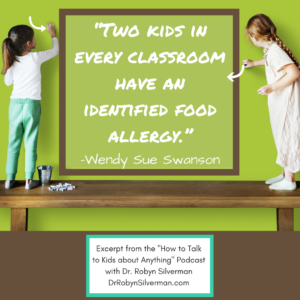 diagnosed with everything from mild sensitivities to full-out anaphylactic responses to certain foods. We’ve heard about issues with peanuts and tree nuts, wheat, soy and other common foods. Many schools have implemented rules around what is safe to bring to lunch or have as a snack in the classroom. Birthday party food menus have had to change or parents sometimes need to provide alternatives. We deal with this in my own house and our lives because my son was diagnosed with Celiac disease in July- Celiac is an autoimmune disorder that makes gluten a dangerous substance for my son to ingest as it causes damage to his small intestine. Whether it’s wheat or soy or egg or nuts- many children don’t understand why certain kids can’t eat certain foods—and why they personally may not be able to consume certain foods around them. Children with food allergies may be frustrated with their limitations or at least with the feeling that they can’t join in to the same food menu with their friends. Of course, we should talk about it. And that’s why we have Dr. Wendy Sue Swanson on the show today.
diagnosed with everything from mild sensitivities to full-out anaphylactic responses to certain foods. We’ve heard about issues with peanuts and tree nuts, wheat, soy and other common foods. Many schools have implemented rules around what is safe to bring to lunch or have as a snack in the classroom. Birthday party food menus have had to change or parents sometimes need to provide alternatives. We deal with this in my own house and our lives because my son was diagnosed with Celiac disease in July- Celiac is an autoimmune disorder that makes gluten a dangerous substance for my son to ingest as it causes damage to his small intestine. Whether it’s wheat or soy or egg or nuts- many children don’t understand why certain kids can’t eat certain foods—and why they personally may not be able to consume certain foods around them. Children with food allergies may be frustrated with their limitations or at least with the feeling that they can’t join in to the same food menu with their friends. Of course, we should talk about it. And that’s why we have Dr. Wendy Sue Swanson on the show today.
Bridging the digital divide between doctors and patients, Dr. Wendy Sue Swanson, Chief of Digital Innovation at Seattle Children’s Hospital has blazed a trail of patient education using her voice through a variety of different channels in traditional and social media. Through her blog, podcast , social media channels and her parenting book she translates science and parenting information to the public. Swanson also regularly partners with reporters in traditional print, online, and television media and makes weekly TV appearances in Seattle with NBC affiliate, KING5 News. She hopes to transform the paternalistic approach to messaging into an empowered, patient-centered one where peers learn from each other and from expert advice online. Check her out at http://seattlemamadoc.seattlechildrens.org/
The podcast provides:
- How big of a problem food allergies are today.
- The foods we need to worry about the most.
- When we should start giving children common allergic foods
- What our children can do to keep classmates with allergies safe
- How we can prepare children who don’t have allergies
- How to prepare our child who does have allergies for parties, school, etc.
- How we can cope with birthday parties- both as host and as parent of a child with allergies
- How we can increase empathy and compassion for kids with allergies
Important Messages:
- Doctors and parents need to work together to find the answers.
- “About 15,000,000 people have a food allergy- 6,000,000 American children do.
- Babies who grew up eating peanut regularly, were eighty percent less likely to develop an allergy to peanut.
- Start with avocado, or whatever you want, but the next go and introduce peanut and then keep introducing it, keeping it, putting it in the oatmeal. Then put some Hazelnut in there. Then put some scrambled eggs in it and keep doing it so that your baby is eating a diverse global diet.
- When it comes to feeding your child high allergy foods, do it the way that you’re comfortable.
- About 75 percent of those who have food allergies, have an allergy to something other than peanut. So don’t wait on introducing peanut.
- Dr. Nadeau who works at Stanford: Her data has really been on treating patients who are food allergic by gradually feeding them what’s called oral immunotherapy– reversing their food allergies, but we’re also looking at this prevention strategy that moms and Dads, if there is no concern, you just get going.
- Food, anaphylaxis or food allergy will present itself within a couple of hours. So if you start avocado today or are you start peanut today and you want to start wheat tomorrow, you can do that.
- Two kids in every classroom has an identified food allergy and one in three kids with a food allergy is bullied because of that food allergy.
- We need to talk to our children, who don’t have food allergies, about food allergies so that they can be more empathetic and compassionate.
- Model compassion for kids with food allergies.
- If you invite a child over who has food allergies, or include him or her in a party, make sure the food is safe for that child or have alternatives. The parent of that child should not have to bring alternative foods.
- Be careful and look at the labels. Don’t ostracize children with food allergies, but really think carefully of how to make them feel awesome. Part of being a great friend and being a host is inviting someone over and having it be a delight for them. Make sure that we’re creating a really safe environment and partnering with families in an open way.
- We don’t want to leave kids with food allergies out, we don’t want them to feel a disability from this. But the reality is a food allergy is a disability and should be protected by them, but at the same time can also be included by the way that we talk about it and the way that we really help kids stand up for themselves.
- The teen years we know are the most dangerous time for children as well and that’s because in some ways kids are more autonomous during that time.
- Your school should have an emergency anaphylaxis plan. Your school classroom, your teachers should know about it. Every parent could check in on that as part of an emergency plan.
Notable Quotables:
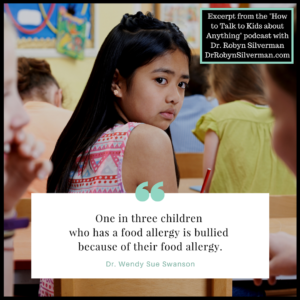
- “So what we see when we look back at the data is that there’s been a doubling of food allergies each of the past few decades.”
- “I was strict and crazy about not letting him even touch a peanut till he was about three and now we think was really bad advice. More and more data is showing that you want to exposure your kids early and regularly to different foods including peanut.”
- “It’s not holding off on these allergens. In fact, it’s the opposite. The old adage, which was me 10 years ago, say, hold off, hold off, hold off on these high allergy foods, has changed to no, no, no, not only peanut, but we want you to have egg wheat and soy and fish and shellfish early in life and not just once, but we want you to incorporate a diet into your baby and toddler and children and teenagers even diet on a regular basis.”
- “There’s no data that says you should try food for three days and then you’ll know if you’re going to have a reaction to a food. I can’t say this clearly enough. If your child has a reaction to food, it will happen within two hours.”
- “Two kids in every classroom have an identified food allergy.”
- “One in three children who has a food allergy is bullied because of their food allergy– which means that’s what 2,000,000 kids in this country, almost one in every classroom is bullied because of their allergy.”
- “Part of being a great friend and being a great host is inviting someone over and having it be a delight for them. So if you invite a child over who has food allergies, or include him or her in a party, make sure the food is safe for that child.”
- “Everyone should kind of know how to operate an EpiPen if you ask me.”
- “One in five kids who has anaphylaxis at school has anaphylaxis to something they didn’t even know they were allergic to in the first place. Kids develop allergies throughout childhood and they’re exposed to things they’ve never tried before they find out they’re allergic to it.
- “If we can train our bodies to run a marathon and we can train our immune systems to not overreact to lots of food. It’s getting all these different foods in early in a child’s life and then continuing to expose them all throughout life. So get fresh fruits and vegetables and tons of different food and your kids. If you’ve got a picky eater, talk with your pediatrician about how to get some all these different proteins into your baby and your older kids every single day. And that is where science and empathy to your point can help us grow healthier and healthier population.”

